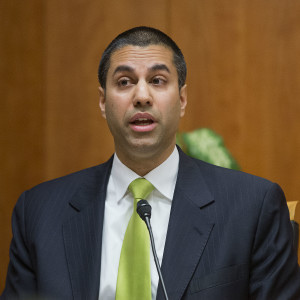President Donald Trump’s pick to lead the Federal Communications Commission says he has “no apologies” to give over the fact his deregulatory agenda has smoothed the road to the Sinclair-Tribune merger — the largest in television broadcast history.
Ajit Pai, the chairman of the federal agency charged with regulating telecommunications providers, told Democrats in the House of Representatives his actions since taking control of the FCC in January weren’t “fueled by a desire to help any particular company,” in a letter dated last week.
“Whether I have been pushing for the revitalization of AM radio or fighting to ensure that broadcast television stations were treated fairly in the incentive auction proceeding, my actions have been motivated by my belief that a strong over-the-air broadcast service advances the public interest,” Pai told lawmakers.
The letter replied to a lengthy list of questions and concerns raised by lawmakers on the left about a series of deregulatory rules changes directly facilitating the merger of the two largest TV broadcasters in the U.S. They also highlighted a number of meetings between Pai and Sinclair executives before the merger was announced, and others with Trump, who made a deal with the broadcaster for favorable coverage during the 2016 election season.
Pai told lawmakers some of the meetings with Sinclair were scheduled before the November election, while others were social and FCC matters weren’t discussed. The content of the others were documented and filed according to FCC rules, including one in January discussing shared-service agreement regulations, which Pai relaxed a month later.
During his meetings with Trump, Pai insisted they didn’t discuss “any pending FCC proceedings” and he does “not recall” Sinclair ever being mentioned.
“[N]either Sinclair nor Tribune nor anyone acting on behalf of either company informed me or my office of a possible transaction involving these companies before the commission voted to reinstate the UHF discount,” Pai wrote. “In terms of other White House officials in the current administration, I do not recall having any discussions with any of them pertaining to the Sinclair Broadcast Group, and I am not aware of anyone in my office having such discussions.”
The ultra-high frequency (UHF) discount is an FCC loophole in Congress’s national broadcasting cap limiting any one company from reaching more than 39 percent of the national audience. The discount allows broadcasters to count only 50 percent of the audience reached by stations broadcasting in UHF, a format considered weak and unreliable when the discount was enacted in the 1980s. The evolution of digital TV technology has eliminated the technological difference, and the Obama administration closed the loophole last year.
Sinclair, the largest owner of broadcast stations in the country, hovered near the cap when rumors swirled in March it may buy Tribune Media, the second-largest. The FCC reinstated the UHF discount a month later, lowering Sinclair’s audience reach on paper to 24 percent and setting the stage for it to buy Tribune. Two weeks later the deal was announced, and if approved, will take Sinclair from 173 stations to 215 and allow it to reach 72 percent of American households.
Pai defended the agency’s timeline for reviewing the transaction, which he said was consistent with other recent mergers, and addressed other concerns raised by Democrats like the approval of next-gen TV technology. The new digital TV format, patented by Sinclair, could collect swaths of data on users. The chairman said adopting the technology, dubbed next-gen TV, will be voluntary and that the agency will ensure private consumer information is protected.
The FCC announced last week it wants more information from Sinclair for its review of the merger, like how the combined companies plan to deal with TV ownership restrictions (since it would still exceed the audience cap by more than 6 percent) and rules limiting how many top stations any one broadcaster can own in a single market. The transaction is also being reviewed by the Department of Justice.

